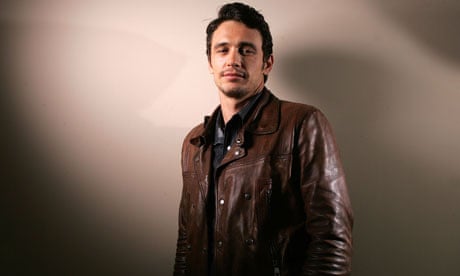It's becoming increasingly clear that James Franco is more than just a pretty face. This may come as a surprise to anyone who knows him primarily as the chisel-jawed heart-throb from the Spider-Man movies, in which he played the son of the Green Goblin, and other high-budget, low-IQ Hollywood entertainments such as Tristan + Isolde. Not exactly groundwork for a parallel career as a writer of short stories that register the influence of Hemingway, Kerouac and Carver and quote casually from Proust.
But recently Franco has been busy defying expectations. As an actor, he has gravitated towards such left-field projects as Milk and the forthcoming Howl, in which he plays Allen Ginsberg during his 1957 obscenity trial. He is a keen painter and he classifies his bizarre ongoing appearances on the US daytime soap General Hospital, playing a sinister artist named "Franco", as performance art. He has written and directed short films and a feature-length documentary about Saturday Night Live, and is planning to shoot an adaptation of Faulkner's As I Lay Dying.
That's not all. Without slowing down his acting career, he recently took four master's degrees at once, studying film-making at NYU, writing at Columbia and Brooklyn College, and poetry at a college in North Carolina. Now he's doing a PhD in Yale. And it's not enough that he's been tipped for a best actor nomination at this year's Oscars for his nerve-shredding performance in Danny Boyle's 127 Hours: he's also presenting the ceremony with Anne Hathaway.
Then there are the stories he's had published in Esquire and McSweeney's. In an epic profile – part-dazzled, part-sceptical – in New York magazine last July, Sam Anderson wrote of Franco's fiction that it "reads like promising work from a writing seminar – not a student whose success you'd guarantee but someone you could see eventually getting there". So now that Franco's first short-story collection is upon us, do we have any clearer sense of whether he is a potentially great artist or merely a greatly prolific one?
Palo Alto, named after the California city where Franco grew up, is a flawed but fascinating work that neither rules out nor confirms either possibility. It's certainly a promising start, and the Hollywood hunk has definite talent.
The book is made up of snapshots of life in Palo Alto as experienced by a series of bored, delinquent teenagers who spend most of their time drink-driving, taking drugs, obsessing over sex and indulging in random acts of violence. (Anyone who enjoyed Franco in Eat Pray Love, with Julia Roberts, may be taken aback by the extreme nature of the material.) Each story is told by a young narrator, and Franco locates the adolescent voice by stripping back his prose and keeping lyrical flights to a minimum. This plays to his strengths. At its most understated, his writing is fleet and often penetrating.
When he does occasionally let fly, it can result in a confused tangle. Reflecting on a friend's missing tooth, one of his more existentialist characters ends up thinking "about three dimensions... and how things, shapes, folded in on themselves, and four dimensions, and if time is variable, then how do I vary it, and why do I want to? Because everything just focuses on me and I hate it". This is from "Jack-O" (published in Esquire last year as "Just Before the Black"), which, to be fair, is the weakest story here.
The stilted prose may have more to do with his confused, semi-articulate young narrators, struggling to dredge meaning out of their directionless lives, but Franco writes so much better when he limits them to short sentences and tiny, rare fragments of insight.
"There was a moon," observes one of his female characters, "and it was on the water. A miniature moon rocking on the little waves. I always see nice images like that but I don't know what to do with them." Elsewhere, someone finds himself with time to think but absolutely no idea what he should be thinking about. Whatever their limitations, however, you never feel that Franco – who went through a delinquent phase himself during his teenage years in Palo Alto – condescends to his characters.
It would be off the mark to say that he is fascinated by them as individuals. The narrative voices barely change between stories. Some are nastier or wittier or marginally more reflective than others, but that's about it. Instead, Franco seems fascinated – obsessed, even – by adolescence itself. The Proust quote at the start of the book states that, in spite of the regrets it may weigh upon us in later life, "adolescence is the only period in which we learn anything". Through sex and stimulants and destructive behaviour amid all the idleness and uncertainty, even these trapped souls experience moments of furious, feral vitality that become alien to us in later life.
In its oddball, fragmentary way, Palo Alto feels like an authentic portrait of teenage alienation in suburban America: hardly a new subject but one that Franco, with the considerable energies at his disposal, makes vivid and distinctive.
It's not all spiritual emptiness and fury: there are moments of unexpected humour here, too. In the collection's best story, "I Could Kill Someone", a nerdy introvert called Teddy decides to buy a gun and murder his jock nemesis, Brent Bauchner. But Teddy's not your stereotypical high-school killer. "I don't like violence," he insists. "I don't play video games, and I don't go to horror movies. I like Steel Magnolias; I like Sally Field."
The Hollywood star's foray into the literary world may be met with cynicism in some quarters, but this is a promising debut from a most unlikely source.

Comments (…)
Sign in or create your Guardian account to join the discussion